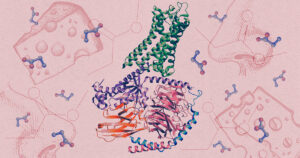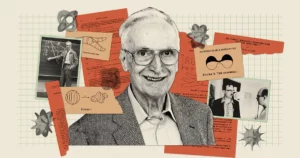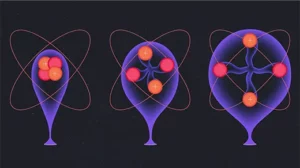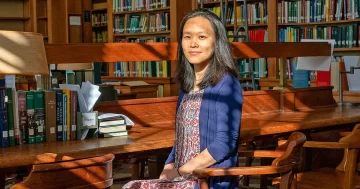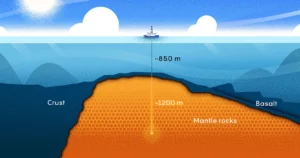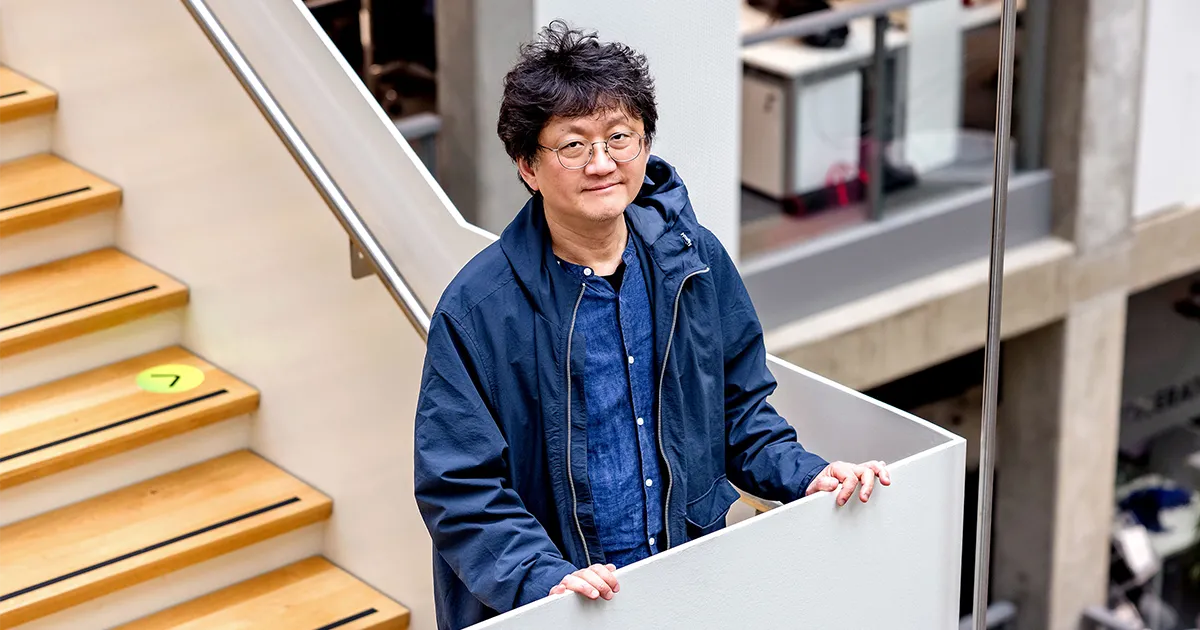
Introduction
Minhyong Kim rejects being called an optimist, but he sounds an awful lot like one. “If we take reality exactly as it is, I don’t think we have any real grounds for pessimism,” he said in a recent conversation.
That outlook is behind Mathematics for Humanity, a program Kim recently started that aims to apply mathematics to perhaps the most ambitious possible challenge: making the world a better place.
For Kim, 59, it’s the next turn in a career that has always maintained an outward gaze. As a mathematician, he’s worked at the highly abstract intersection of number theory and geometry. Yet he’s often looked outside the field for inspiration. In particular, he has embraced physical intuition, attempting to draw a precise analogy between millennia-old mathematical problems and ideas from modern physics, as Quanta reported in 2017.
At the same time, Kim has published nine books about mathematics for the general public in his native South Korea. Many hit the bestseller list, including his 2018 title The Moment You Need Mathematics. “The motivation there primarily, it was just fun. I just enjoyed doing it,” Kim said.
With Mathematics for Humanity, Kim’s intent is more serious. He’s leading the program as the recently appointed director of the International Center for Mathematical Sciences in Edinburgh, and he’s organized it to encompass several interrelated goals. First, he wants to give grants to mathematicians and scientists who want to apply math to pressing social challenges. Applicants include researchers at the Institute for Mathematics and Democracy in Boston, which seeks to shape public policy through mathematical thinking, and the Vietnam Institute for Advanced Study in Mathematics, which is developing mathematical tools to address climate change.
A second goal is educational. He wants to broaden the history of the field to more accurately reflect the uncertain origins of many foundational ideas. For example, the core of the mathematical canon is popularly assumed to originate in the teachings of white men in ancient Greece. But in fact, much of that knowledge emerged in the vastness of the ancient Greek empire, which included the modern-day Middle East and North Africa. For Kim, this whitewashing pushes away young people who might contribute to mathematics but don’t see it as belonging to them.
Kim’s perspective, broadly, is that more people in math, and more math in the world, can only be a good thing. He points to advances as varied as Google’s search algorithm and Amartya Sen’s economics of well-being as salutary consequences of good mathematical training. He thinks the opportunities for these kinds of crossover applications are only growing as a result of the enhanced role technology and information play in society.
Quanta spoke with Kim about his goals for Mathematics for Humanity and about the fluid nature of today’s mathematical careers, why he doesn’t think the world’s problems are more acute than they’ve always been, and the hazy historical origins of Euclid’s ideas. The interview has been condensed and edited for clarity.
Introduction
What are you trying to achieve with Mathematics for Humanity?
I’m trying to create a network of partner institutions that will feel like there’s one network of mathematics for humanity to which they belong. A sense of connectedness in the work you do is always a good thing. If it feels like you’re just doing some isolated thing, that will peter out. So at least among mathematicians, we want to create a greater sense of connectedness among the people who are trying to make the world a better place.
Will the mathematicians involved with Mathematics for Humanity be more on the pure math or applied math side?
Even among mathematicians, I think there’s a misconception about this idea of pure mathematics versus applied mathematics. It’s very recent in the history of mathematics to think so rigidly about this division. The reality of mathematics is very complicated and very mixed all the time.
If you look at young mathematicians, there are many people who are very diverse and energetic in their interests compared to old people like me. There are people who are able to work in industry and academia at the same time; there are people who work on number theory but also work on the mathematics of democracy at the same time. There are all kinds of combinations that people seem to be able to manage.
Introduction
Is it dangerous for young mathematicians to put time into projects like the ones Mathematics for Humanity wants to fund when they need to be building a research resume to get tenure?
I see people who start out with actually pretty good academic careers but move to some industrial position that they find more interesting for a while and then come back. This seems to happen these days. I don’t think the barrier between academia and other kinds of work is as high as it used to be.
For example, one of my Ph.D. students is now working at a small think tank in Washington that advises members of Congress on scientific issues. That’s the kind of work that seems to appeal to a lot of young people, even my own son. He’s in a Ph.D. program in physics and computing, but the whole program seems to be funded by Google DeepMind.
So there is a lot of fluidity of researchers moving between the university and industrial research. The same should be true of academic research and research for human welfare. I hope Mathematics for Humanity can help to create greater professional respect for this kind of fluidity.
Why is there more fluidity?
There are so many more things that a mathematician can do with all the different technological, information-theoretic revolutions that have been surrounding us for quite a while. The greater importance of mathematics in society at the moment provides opportunity and flexibility as long as people are energetic enough to take advantage of these things.
Is that good for math?
If there are well-trained mathematicians working in other sectors of society, that can only be good for mathematics in the long, long run. I know there are people who don’t think this way. Some of my colleagues think that, well, we train all these students, give them a Ph.D. and even give them a postdoctoral position or something, and if they go work for Google, it’s a loss of our effort. I don’t agree with that at all.
Introduction
Why not?
I think, first of all, primarily, we’re training them for their own sake, not for ours. Of course, community benefits will come out of the situation in some way. But mostly, it’s about their individual fulfillment that we’re here for when we’re educating them. How they find meaning in life, it’s up to them.
Secondly, I think mathematical sophistication is very important in understanding the world at present in many possible ways. You definitely need to have a sophisticated mathematical view that you combine with other things to understand the world. Now, if there are a lot of such people in society, then people who teach and produce new mathematics, it’s hard to think that they wouldn’t benefit from it. If, in other words, you have a mathematically sophisticated society, the status of the people who are specialists in mathematics [will improve].
What are some examples of social benefits that flow from mathematics?
Think about something like social choice theory, which is usually viewed as an area of economics. The idea is, we all have individual preferences, right? But somehow, we have to come up with a social decision. The most obvious thing is when we vote in an election, but it’s much wider than that. We’re turning individual choices into social choices all the time.
The first person to sort of make his name this way was Kenneth Arrow, who received the Nobel Prize for it. And Amartya Sen’s welfare economics is also based on social choice theory. And I think all of these people would admit right away that their conception of social choice theory was only possible because they had mathematical training. The formulation of social choice theory is all about functions and existence of functions of this or that type. So their ability to think abstractly about this process of taking individual choice, aggregating it and turning it into a social tree was deeply informed by mathematics.
Are there more concrete examples?
I guess maybe one way of saying it is there’s mathematics that’s used right away, for example, by an engineer in making a machine, or the information theory that goes into a phone. But here’s a question. Are Google’s search engines good for the world or not? Maybe some people think it’s bad, right? I tend to think it’s overall good. This accessibility of information around the world, I think, in spite of the chaos it introduces, eventually leads to better understanding of the world, and between people as well.
But of course what goes into the Google search engine is linear algebra. A rather abstract understanding of linear algebra is what made it possible. This kind of surprising innovation that leads to what’s almost, what you might even call an incalculable good. It often comes from a mathematical background. There are already many mathematicians who are applying insights of this sort to immediate challenges like the climate crisis, sustainable economics or accessible education. We would like to help these people and encourage more people to join the effort.
Introduction
Education about the history of mathematics is a big part of Mathematics for Humanity. Why did you choose this?
I can say fairly confidently that a lot of what we as mathematicians understand about the history of mathematics is nonsense. There’s been so much misinformation about how mathematics has been created throughout human history. There’s an idea that somehow, one day mathematics was invented in Greece. And then there were these terrible Dark Ages. Then mathematics was re-created in the Renaissance, and so on. There’s very little substantiation for many such standard histories.
Can you give me a specific example of why this matters?
In 1785 Thomas Jefferson wrote “Notes on the State of Virginia.” He says there that Black people could scarcely be capable of tracing and comprehending the investigations of Euclid. In other words, he’s saying that Black people could not possibly understand Euclid.
Now, what’s really striking about this is, we know almost nothing about Euclid. We don’t even know if this was a real person, whether it was a man or a woman or a collective or anything. The only piece of information that many people seem to agree on is that Euclid lived in Africa most of their life (if they existed).
How has this misunderstanding shaped the way the history of math is taught?
A lot of the creators of the canon of mathematics, we have no idea of their ethnicity, we have no idea of their cultural background. There are various weak reasons that some of them were labeled as Greeks, whatever that means. For example, there’s heavy reliance on the language they wrote in. That’s like saying now that most of the world’s mathematicians are English.
Introduction
Why is this a problem?
The problem is, it alienates a lot of the world from a sense of ownership of the mathematical heritage. And my view is that this is a serious obstacle to making mathematics, education, research and powerful mathematical tools accessible to most of the world.
What can you do about it?
We’re saying even the standard mathematical tools and its conceptual history have been told in a way that’s very, very inaccurate, and we want to set it right. We’ll be providing resources for people working on this project to hold [classes] and workshops, and to come here and collaborate on redoing and creating a more accurate understanding of the way mathematics has developed throughout history.
Introduction
Are young people more engaged now given the global challenges such as war, the pandemic and climate change?
Maybe I’m just being loose with the definition of young people, but people seem to be much more concerned about making the world a better place than, for example, people of my generation.
I agree with the premise that sometimes people feel a sense of doom and gloom. I don’t think that this is really justified. I think one reason it arises in our world right now is the greater capacity for communication. We’re always paying close attention to what goes on all over the world. When there’s a calamity somewhere we know about it. So this gives a greater sense of crisis.
But I think another aspect is that because of all this news arriving from all parts of the world, many people actually care. They are really worried. I mean, there were poor people starving in different parts of the world throughout all of history, right? And for most of history, we didn’t know about it. Of course, there are many things we still aren’t aware of. But overall, there’s a greater overall sympathy for the misery that some people suffer around the world. And I suspect that that’s a strong part of what creates this sense of doom and gloom. But these problems were there before, so obviously, our awareness of them now provides the potential for us to do something about it. This isn’t to deny that there are serious challenges that have to be addressed.
You sound like an optimistic person.
I don’t think it’s an optimistic worldview. I think it’s a realistic worldview. Sometimes it’s fashionable to be pessimistic. You probably know about this book that created a lot of discussion a number of years ago by Steven Pinker, Better Angels of Our Nature. That book received a lot of just criticism, but the part of it I do like is where he points out, very clearly, that skepticism needs to be based on concrete evidence. And if you ask, within a historical perspective, what the concrete evidence for skepticism is, I don’t think there are such strong grounds at the moment for such a thing.
- SEO Powered Content & PR Distribution. Get Amplified Today.
- PlatoAiStream. Web3 Data Intelligence. Knowledge Amplified. Access Here.
- Minting the Future w Adryenn Ashley. Access Here.
- Buy and Sell Shares in PRE-IPO Companies with PREIPO®. Access Here.
- Source: https://www.quantamagazine.org/a-plan-to-address-the-worlds-challenges-with-math-20230511/
- :has
- :is
- :not
- :where
- ][p
- $UP
- 2018
- a
- ability
- Able
- About
- about IT
- ABSTRACT
- Academia
- academic
- academic research
- accessibility
- accessible
- accurate
- accurately
- Achieve
- actually
- address
- admit
- advanced
- advances
- ADvantage
- africa
- Ages
- aggregating
- ago
- aims
- algorithm
- All
- already
- also
- always
- ambitious
- among
- an
- Ancient
- and
- angels
- Another
- any
- anything
- appeal
- applicants
- applications
- applied
- Apply
- Applying
- appointed
- ARE
- AREA
- around
- arriving
- AS
- aspect
- assumed
- At
- attempting
- attention
- aware
- awareness
- away
- back
- background
- Bad
- barrier
- based
- BE
- because
- been
- before
- behind
- being
- benefit
- benefits
- Better
- between
- Big
- Black
- book
- Books
- boston
- broaden
- broadly
- Building
- but
- by
- call
- called
- CAN
- capable
- Capacity
- care
- Career
- careers
- Center
- challenge
- challenges
- change
- Chaos
- choice
- choices
- Choose
- clarity
- classes
- clearly
- Climate
- Climate change
- climate crisis
- Close
- collaborate
- colleagues
- Collective
- combinations
- combine
- come
- comes
- Communication
- community
- compared
- complicated
- computing
- conception
- conceptual
- concerned
- confidently
- Congress
- Consequences
- contribute
- Conversation
- Core
- could
- Course
- create
- created
- creates
- Creating
- creators
- crisis
- criticism
- cultural
- Dangerous
- Dark
- day
- Days
- decision
- DeepMind
- definitely
- Democracy
- developed
- developing
- DID
- different
- Director
- discussion
- diverse
- Division
- do
- Doesn’t
- doing
- Dont
- doom
- draw
- East
- Economics
- educating
- Education
- educational
- effort
- Election
- embraced
- emerged
- Empire
- encompass
- encourage
- engaged
- Engine
- engineer
- Engines
- English
- enhanced
- enough
- ethnicity
- Even
- eventually
- evidence
- exactly
- example
- examples
- fact
- fairly
- feel
- field
- Find
- First
- Flexibility
- flow
- fluid
- fluidity
- For
- from
- fun
- functions
- fund
- funded
- General
- general public
- generation
- get
- Give
- given
- gives
- Global
- Go
- goal
- Goals
- Goes
- good
- Google Search
- Google’s
- grants
- greater
- Greece
- grounds
- Growing
- had
- happen
- Hard
- Have
- Hazy
- he
- heavy
- help
- here
- heritage
- High
- highly
- his
- historical
- history
- Hit
- hold
- hope
- How
- HTTPS
- human
- Humanity
- i
- idea
- ideas
- if
- immediate
- importance
- important
- improve
- in
- In other
- inaccurate
- include
- included
- Including
- individual
- industrial
- industry
- information
- informed
- Innovation
- insights
- Inspiration
- Institute
- institutions
- intent
- interesting
- interests
- intersection
- Interview
- into
- Introduces
- Invented
- Investigations
- involved
- isolated
- issues
- IT
- ITS
- join
- just
- Kim
- Kind
- Know
- knowledge
- korea
- language
- leading
- Leads
- least
- Life
- like
- List
- little
- Long
- Look
- looked
- loss
- Lot
- machine
- made
- make
- Making
- man
- manage
- many
- many people
- math
- mathematical
- mathematically
- mathematics
- Matters
- mean
- meaning
- means
- Members
- Men
- Middle
- Middle East
- might
- Misinformation
- misunderstanding
- mixed
- Modern
- moment
- more
- most
- mostly
- Motivation
- move
- moving
- much
- my
- name
- native
- Nature
- Need
- needs
- network
- New
- news
- next
- no
- nobel prize
- North
- nothing
- now
- number
- obstacle
- obvious
- of
- often
- Old
- on
- ONE
- ones
- only
- opportunities
- Opportunity
- Optimistic
- or
- Organized
- Other
- our
- out
- Outlook
- outside
- over
- overall
- own
- ownership
- pandemic
- part
- particular
- partner
- parts
- paying
- People
- perhaps
- person
- perspective
- pessimism
- pessimistic
- Peter
- phone
- physical
- Physics
- piece
- Place
- plan
- plato
- Plato Data Intelligence
- PlatoData
- Play
- points
- policy
- poor
- position
- possible
- possibly
- potential
- powerful
- precise
- preferences
- present
- pressing
- pretty
- primarily
- prize
- probably
- Problem
- problems
- process
- produce
- professional
- Program
- project
- projects
- provides
- providing
- public
- published
- put
- Quantamagazine
- question
- rather
- real
- realistic
- Reality
- really
- reason
- reasons
- received
- recent
- recently
- reflect
- reliance
- Renaissance
- research
- researchers
- Resources
- respect
- result
- resume
- right
- Role
- Run
- Said
- sake
- same
- say
- saying
- says
- scientific
- scientists
- Search
- search engine
- Search engines
- Second
- Sectors
- see
- Seeks
- seem
- seems
- sense
- serious
- set
- several
- Shape
- shaped
- should
- side
- situation
- Skepticism
- small
- So
- Social
- Society
- some
- something
- somewhere
- son
- sophisticated
- Sound
- South
- South Korea
- specialists
- specific
- Spite
- standard
- start
- started
- State
- Status
- Still
- strong
- Students
- Study
- such
- surprising
- Surrounding
- sustainable
- Take
- taking
- tank
- technological
- Technology
- than
- that
- The
- the information
- The State
- the world
- their
- Them
- then
- theory
- There.
- These
- they
- thing
- things
- think
- think tank
- Thinking
- Thinks
- this
- Through
- throughout
- time
- Title
- to
- today’s
- tools
- Tracing
- Train
- Training
- tree
- true
- TURN
- Turning
- type
- Uk
- Uncertain
- understand
- understanding
- university
- us
- used
- usually
- various
- Versus
- very
- very diverse
- View
- virginia
- Vote
- want
- wants
- war
- was
- washington
- Way..
- ways
- we
- webp
- Welfare
- WELL
- were
- What
- whatever
- when
- whether
- which
- while
- white
- WHO
- whole
- why
- wider
- will
- with
- within
- woman
- words
- Work
- worked
- working
- Workshops
- world
- world’s
- worried
- would
- years
- yet
- You
- young
- zephyrnet


